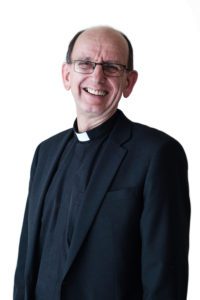The Revd Preb Dr Neil Evans is a member of the Council of Reference for St Augustine’s College, representing the Diocese of London. He is Director of Ministry for London Diocese. We asked him to tell us about his role and how he sees the role of St Augustine’s in training ministers for the future Church of England.

As Director of Ministry for the Diocese of London I have strategic overview for ministry in the diocese. My role includes being Diocesan Director of Ordinands and also Warden of Licensed Lay Ministry. I am fortunate in having excellent colleagues in the five Episcopal Areas in London who undertake the day to day work of vocation discernment, post ordination training (IME2), lay leadership development and continuing ministerial development.
I’ve been in London diocese since I was ordained 36 years ago, and indeed I worked as a manager in the Health Service in London before ordination. I’ve spent well over half of my ordained ministry as a parish priest, first in Tower Hamlets and Hackney and latterly in Twickenham, so London runs through me like the name in a stick of rock! I still regard myself as a parish priest at heart and love working with the dedicated and outstanding clergy and colleagues in the diocese. Alongside my work in ministry support, training and development, I am keen to make sure that I stay grounded in parish ministry and am constantly reminded of the core of my calling as a priest in God’s church.
The vocations and ordinands work is a large area of my responsibilities in London. We have an increasing number of people offering themselves for ordained ministry, with an exciting, diverse and often young profile. One of the principle areas we are exploring at the moment, though, is how we can increase the diversity amongst our ordinands and particularly attract and encourage candidates from underrepresented groups. We are having some modest success in this area, supported by some exciting initiatives. Taking seriously Unconscious Bias Training and offering support through the discernment process to those from disadvantaged backgrounds have been significant.
How do you approach the discernment process?
The world is changing, and in a positive way. There used to be a sense that, once you started the discernment process it was a bit like a conveyor belt, and sooner or later you’d get to the end and be ordained. And further, that ordained ministry was the pinnacle of vocation. There has long been misconception in the church that the word ‘vocation’ means putting on a dog collar!
My passion is that every Christian has a vocation, and that God continues to call us to new things throughout our lives. I’m always keen that we begin with the question, “what is God calling you to?” That may be ordained ministry, but all are called to a rich variety of vocations; we are all called to live our Christian vocation in our world. The reality, of course, is that by the time someone gets to see a DDO they are a reasonable way along that thinking, but the discernment process should help each person to seek God’s call on their life. Listening, challenging, exploring and praying are key to the process for directors or ordinands.
The Church of England has developed a new discernment process, which I am very excited about. I believe it offers a much more rounded approach to discernment, enabling each person to be assessed on their individual gifts, talents, experience and passions. Calling is also about the Church’s calling, so the discernment process has to be about community. The development of group work with potential ordinands will assist greatly in the discernment process, allowing candidates to explore their vocation with others.
What are the challenges for the Church of England?
I’m acutely aware that there are huge questions being asked about the future shape of the Church of England. These questions have been brought into stark relief with Covid-19. The reality is, of course, that we simply don’t know what the church will look like in 10, 20, 50 years’ time. We will need to train our clergy to be open, adaptable and fleet of foot.
We also need to take lay discipleship and lay leadership far more seriously. There are many questions being asked in society at large about faith, spirituality and God. It is vital that we equip all God’s people to speak confidently of the love of God and the Good News of Jesus Christ, and find new ways of meeting people where they are.
I am convinced that Parish ministry is still a bedrock of faith in the country, but we don’t yet know what that will look like in the future, and in many ways we don’t even know what questions we need to ask yet. Rather than grab too soon at easy answers, I hope we will have the confidence to say, “let’s see what’s happening, and allow the Holy Spirit to guide us.” Or to put it another way, see what God is doing and join in. I believe we need to be encouraging people in training to think broadly, and we all need to be open to where the Spirit is calling us. It seems to me that St Augustine’s is well equipped to explore the unanswered questions of the future and prepare ordinands for a changing world, a changing ministry.
How is St Augustine’s helping to address this?
I’ve been very impressed with St Augustine’s, and am delighted to be associated with the College, as it offers an alternative model to the theological colleges that many of our ordinands attend. It is relatively small, which is particularly attractive for some students, particularly those who are coming to theological study and ordination later in life. In a smaller college, students feel more likely to be noticed, and I have been aware of a real sense of belonging from those who have been a part of the college. I encourage my colleagues to offer St Augustine’s as an alternative, knowing that it will be right for some.
In discussions at the Council of Reference we have consistently looked forward to the future needs of the church and the future needs of students. The College is keen to train and equip students for 21st Century London and the South East. In the Diocese of London we are developing a mission and ministry strategy, looking forward to 2030. Our simple strap line is ‘For every Londoner’. We want the Church of England to be a Church for all those who live in this great world city where the love of God in Christ is encountered. I am convinced that St Augustine’s will continue to be a vital partner in bringing that vision to fruition.

